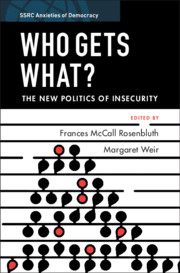Book contents
- Who Gets What?
- SSRC Anxieties of Democracy
- Sponsored by the Social Science Research Council
- Who Gets What?
- Copyright page
- Contents
- Figures
- Tables
- Author Biographies
- Acknowledgments
- 1 Introduction
- Part I People
- Part II Places
- Part III Politics
- 9 Electoral Realignments in the Atlantic World
- 10 Political Parties in the New Politics of Insecurity
- 11 The Peculiar Politics of American Insecurity
- 12 The Anxiety of Precarity
- 13 Increasing Instability and Uncertainty among American Workers
- Index
- References
10 - Political Parties in the New Politics of Insecurity
from Part III - Politics
Published online by Cambridge University Press: 20 August 2021
- Who Gets What?
- SSRC Anxieties of Democracy
- Sponsored by the Social Science Research Council
- Who Gets What?
- Copyright page
- Contents
- Figures
- Tables
- Author Biographies
- Acknowledgments
- 1 Introduction
- Part I People
- Part II Places
- Part III Politics
- 9 Electoral Realignments in the Atlantic World
- 10 Political Parties in the New Politics of Insecurity
- 11 The Peculiar Politics of American Insecurity
- 12 The Anxiety of Precarity
- 13 Increasing Instability and Uncertainty among American Workers
- Index
- References
Summary
Political moderation in developed economies after World War II owed much to the large number of stable, well-paying industrial jobs. The decline in the number of working-class jobs has dealt a hard blow to parties on the center-left, causing them to fragment into smaller and more extreme parties. This is especially true in proportional representation electoral systems, which give voters little reason to vote for large parties in the political middle. Employing a novel dataset of parties’ vote share and seat share in 35 OECD countries from 1945 to 2017, we find that every 20 percent drop in the number of industrial jobs adds one more party on the left. We find a corresponding decline in policy moderation as the left fragments. In the United States and Britain, where majoritarian electoral rules limit party fragmentation, economic insecurity takes other forms including attacks on parties’ ability to formulate and implement moderate policies.
- Type
- Chapter
- Information
- Who Gets What?The New Politics of Insecurity, pp. 237 - 258Publisher: Cambridge University PressPrint publication year: 2021

